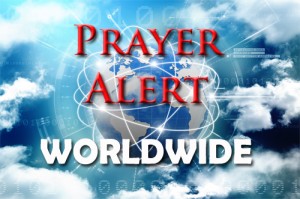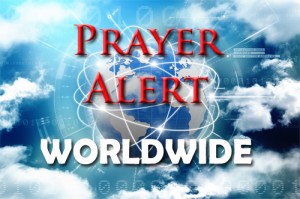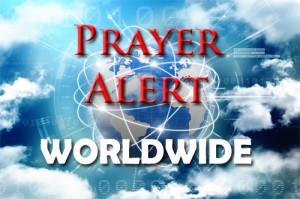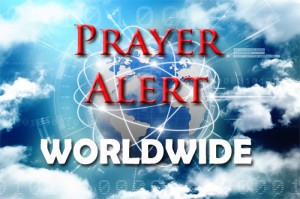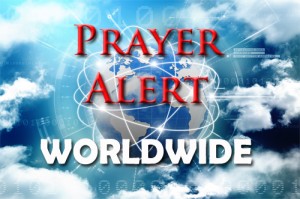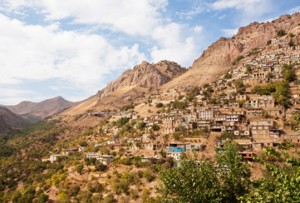Displaying items by tag: Iraq
Iraq: corruption and elections
Vice-president Nouri al-Maliki wants to regain the premiership he lost in 2014, and many believe he is leveraging his influence over the judicial process to marginalise political rivals ahead of the elections on 12 May. Iraq’s savvy and powerful politicians are using judicial, legislative, and procedural means to disqualify their opponents or break up opposing coalitions, especially after candidate lists were filed on 10 February. Such disqualifications undermine the legitimacy of the Iraqi government in ways that accelerate insurgency and negate the military gains the US has made against IS in Iraq. Meanwhile Islamic leaders slander Christians in mosques, leading to further persecution. Government officials, both national and local, have threatened Christians, ‘encouraging’ them to leave the country. Political parties who hinder pluralism also contribute to the persecution of Christians in the public space. See
215 Million Christians Persecuted, Mostly by Muslims
by Raymond Ibrahim January 21, 2018 at 5:00 am
https://www.gatestoneinstitute.org/11775/persecuted-christians-open-doors
In short, the overwhelming majority of persecution that these 215 million Christians experience around the world — especially the worst forms, such as rape and murder — occurs at the hands of Muslims.
If time is on the side of Christians living under Communist regimes, it is not on the side of Christians living under Islam. The center of the great Christian Byzantine Empire is now an increasingly intolerant, rapidly Islamizing Turkey. Carthage, once a bastion of Christianity — where one of Christendom's greatest theologians, St. Augustine, was born and where the New Testament canon was confirmed in 397 — is today 99% Muslim-majority Tunisia.
As what began in the seventh century comes closer to fruition and the entire world becomes more Islamic and "infidel" free, as in Iraq, confronting these uncomfortable facts is at least a welcome first step in countering the problem.
"215 million Christians experience high levels of persecution" around the world, according to Open Doors, a human rights organization. On its recently released World Watch List 2018, which ranks the world's 50 worst nations wherein to be Christian, 3,066 Christians were killed, 1,252 abducted, and 1,020 raped or sexually harassed on account of their faith; and 793 churches were attacked or destroyed.
The Islamic world had the lion's share of this persecution; 38 of the 50 worst nations are Muslim-majority. The report further cites "Islamic oppression" behind the "extreme persecution" that prevails in eight of the 10 worst nations. In short, the overwhelming majority of persecution that these 215 million Christians experience around the world — especially the worst forms, such as rape and murder — occurs at the hands of Muslims.
These Muslims come from all walks of life and reflect a variety of races, nationalities, languages, socio-economic and political circumstances. They include Muslims from among America's closest allies (Saudi Arabia #12 worst persecutor) and Muslims from its opponents (Iran #10); Muslims from rich nations (Qatar #27 and Kuwait #34) and Muslims from poor nations (Afghanistan #2, Somalia #3, and Yemen #9); Muslims from widely recognized "radical" nations (Pakistan #5), and Muslims from "moderate" nations (Malaysia #23 and Indonesia #38).
But if the World Watch List ranks North Korea — non-Islamic, communist — as the number one worst persecutor of Christians, why belabor the religious identity of Muslims? Surely North Korea's top spot suggests that Christian persecution is not intrinsic to the Islamic world but is rather a byproduct of repressive regimes and other socio-economic factors that proliferate throughout the Muslim world?
There are some important distinctions that need to be made. While Christians are indeed experiencing a "life of hell" in North Korea, overthrowing Kim Jong-un's regime could not only lead to a quick halt to this persecution but also to a rise of Christianity — as has happened recently in Russia. Under the Soviet Union, between 12 and 25 million Christians were killed for their faith[1], and approximately 153,000 churches were shut down.[2] Since the fall of the Soviet Union in 1991, about a thousand churches have been (re)built every year, and, according to a 2014 Pew report, between 1991 and 2008, Russians identifying themselves as Orthodox Christian rose from 31% to 72%. That "South Korea is so distinctively Christian" reflects what could be in store — and creating fear for — its northern counterpart.
In the Islamic world, the fall of dictatorial regimes rarely seems to alleviate the sufferings of Christians. On the contrary, when secular dictators fall — Saddam in Iraq, Qaddafi in Libya, and attempts against Assad in Syria — persecution of Christian seems to rise as a grassroots byproduct. Today, Iraq is the eighth worst nation in the world in which to be Christian, Syria is fifteenth, and Libya seventh. Under dictators, these countries were significantly safer for religious minorities.
A militiaman from the Nineveh Plain Protection Units (NPU) walks through a destroyed church on November 8, 2016 in Qaraqosh, Iraq. The NPU is a militia made up of Assyrian Christians that was formed in late 2014 to defend against ISIS. Qaraqosh is a mostly Assyrian city near of Mosul that was captured by ISIS in August 2014, and liberated in November 2016. (Photo by Chris McGrath/Getty Images)
Similarly, the only countries that were part of the former Soviet Union that still persecute Christians are, rather tellingly, the Muslim-majority ones of Central Asia. These include Uzbekistan (#16 worst persecutor), Turkmenistan (#19), Tajikistan (#22), Kazakhstan (#28) and Azerbaijan (#45).[3]
The "extreme persecution" of Christians throughout the Muslim world is part of a continuum begun nearly fourteen hundred years ago. The same patterns of persecution are still prevalent — including attacks for blasphemy and apostasy, restrictions and attacks on churches, and a general contempt for — followed by the vile treatment of — "subhuman infidels."
Unlike the persecution of Christians in Communist nations, rooted to a particular regime, Muslim persecution of Christians is perennial, existential, and far transcends any ruler or regime. It unfortunately seems part and parcel of the history, doctrines, and socio-political makeup of Islam — hence its tenacity and ubiquity. It is a "tradition."
That those persecuting Christians come from a wide variety of racial, linguistic, cultural, and socio-economic backgrounds — from African, Arab, Asian, and Caucasian nations — and share little in common with one another, except for Islam, sadly only further underscores the true source of the persecution.
If time is on the side of Christians living under Communist regimes, it is not on the side of Christians living under Islam. The center of the great Christian Byzantine Empire is now an increasingly intolerant, Islamizing Turkey. Carthage, once a bastion of Christianity — where one of Christendom's greatest theologians, St. Augustine, was born and where the New Testament canon was confirmed in 397 — is today 99% Muslim-majority Tunisia. Centuries of persecution and forcing non-Muslims to live as barely-tolerated third-class residents are responsible for the demographic shift that Tunisia and other formerly non-Muslim nations are experiencing.
Long after North Korea's Kim Jong-un has gone, tens of millions of Christians and other "infidels" will still suffer persecution. As what began in the seventh century comes closer to fruition and the entire world becomes more Islamic and "infidel" free, as in Iraq, confronting these uncomfortable facts is at least a welcome first step in countering the problem.
Raymond Ibrahim is the author of Crucified Again: Exposing Islam's New War on Christians (published by Regnery with Gatestone Institute, April 2013).
[1] James M. Nelson, Psychology, Religion, and Spirituality, 2009, p. 427.
[2] Paul Froese, "Forced Secularization in Soviet Russia: Why an Atheistic Monopoly Failed," Journal for the Scientific Study of Religion, Volume 43, Number 1, March 2004, p. 42
[3] While Open Doors ascribes the persecution of Christians in these five nations to "Dictatorial Paranoia," considering that they are all overwhelmingly Muslim majority, it seems reasonable to conclude that Islam is at least partially responsible. Open Doors itself notes that "There is a grassroots revival of Islam in Central Asia, and that means more pressure from the nationalist pro-Islamic governments and within society—causing increased persecution levels on two fronts."
The 50 worst places on Earth for Christians
'They will just execute somebody who commits their life to faith'
http://www.wnd.com/2018/01/the-50-worst-places-on-earth-for-christians/
215,000,000 Christians Persecuted, Mostly by Muslims
https://www.gatestoneinstitute.org/11775/persecuted-christians-open-doors
‘God has been with me always’
After nearly three years in exile in Kurdistan, ten-year-old Helda Hindi and her younger brother and parents who fled from IS have returned to their home town in the Nineveh plains. She spoke about the night of 6 August 2014, when IS seized her hometown. ’Alarm bells rang out in our streets - we had to escape the living hell of violence and terrorism. I left, crying, with no hope of ever seeing my town, my school, or my friends again. We lived in torment and tragedy until we got used to it.’ She related her harrowing experiences, but finished, ‘And today, by God's grace, we have returned to our town and I am back in school among my friends. We had only God and we never stopped believing in His power and praying for His mercy for all those hurting in Iraq and around the world.’
Iraq: Islamists dump religion for upcoming elections
Islamist parties in Iraq are shedding their religious platforms to focus on reform in the campaign for upcoming elections in May, and are also allying with secular parties. Out of 200+ Islamist parties registered with the independent electoral commission, only ten have names explicitly invoking Islam. This development clearly shows the overall decline in Islamic movements, both Shiite and Sunni, compared with previous elections in which Islamist parties accounted for more than half of the registered groups. Many Iraqis blame political Islam for the tragedies and corruption plaguing their country, as Islamists have held the reins of power since 2005. At present Shiite political power influences state institutions and there is ongoing support from Iran, so we need to pray for God’s intervention in the elections.
Syria/US/Turkey: fragile relationships
The USA is working with the Kurdish-led Syrian Democratic Forces (SDF) to create a border force, potentially 30,000 fighters, along the Turkey/Iraq borders and along the Syrian side of the Euphrates. Since 2014 it has led the coalition of nations using air strikes and specialist troops to fight IS across Syria and Iraq. IS has now lost most of that territory. For much of the war, the US and Turkey worked together against the Assad government. But this decision to back Kurdish fighters has enraged Ankara, and Syria denounced any new border force as an assault on its sovereignty, adding that Syrians joining the force would be ‘traitors’. Turkey vowed to ‘drown’ Kurdish border security forces in bullets, and Erdogan accused America of forming a ‘terrorist’ force on Turkey’s border. The fragile state of relations between the nations deteriorates.
Iran, Saudi Arabia, Iraq: instability
Iran’s regional activities have stretched its capacity, its economy is already in difficulty, and while President Trump has said he will renew the sanction waivers one last time, a collapse of the nuclear enrichment agreement would cause severe problems. It is not known who might replace the ailing Supreme Leader, Ayatollah Khamenei, in the near future. In Saudi Arabia Crown Prince Mohammad bin Salman is assuming greater power while preparing to become king. He has liberal policies on economic reforms, and some foresee possible attempts to prevent his coronation. When Kurds voted for independence Iraq experienced political chaos, and challenges remain as they prepare to elect a new parliament in May. Meanwhile Christian villages are being freed from jihadists and the faithfulness of the region’s church is causing Muslims, disillusioned by violence perpetrated in the name of religion, to walk the path of peace and reconciliation.
Iraq: victory parade
On 9 December, Iraqi forces recaptured the last areas still under IS control along the Syrian border and secured the western desert. This ended the war against the militants, three years after they had captured about a third of Iraq’s territory. The following day a military parade in Baghdad’s heavily fortified Green Zone celebrated the final victory, with prime minister Abadi looking on as troops marched in formation, their bodies spelling ‘victory day’ in Arabic. He announced that 10 December would be an annual national holiday. However In his victory speech he did not mention the Peshmerga, who played a big part in the fight against IS. Instead he hailed the Iranian-trained and backed PMF Shiite militias, many of whom are loyal to Iran.
Petition for persecuted Christians presented to UN
The 'Hope for the Middle East' petition, signed by over 800,0000 people, was presented at the United Nations on 12 December, urging the protection of Christians and other persecuted minorities in Iraq and Syria post-IS. It calls on the UN to work with religious leaders to maintain peace and rebuild Iraq and Syria.
A new day dawning
Over the years Prayer Alert has highlighted prayer requests from ‘Cry Out Now’. Your prayers protected believers and birthed many disciples across Lebanon, Syria, Jordan, and Iraq. At a recent Cry Out Now prayer conference, a lady at the hotel heard their worship and was drawn to the room. She said she felt that God was there. After some women shared with her, she gave her life to Jesus. They also prayed for a group of believers who were standing on a large map of the region that they came from. Once the prayer time was finished, there were tears on the map. The conference was called Harvest Rain, and during the sessions there was physical rain across Lebanon. Also people working among the Bedouin shared encouraging stories of getting opportunities, for the first time, to share the gospel and pray for the sick.
Shakings on the Borders of Iraqi Kurdistan
As we write, reports are still coming in of a large earthquake (7.3 on the Richter scale) which struck during the night on the border between Iraqi Kurdistan and Iran. The quake, centered just southwest of the Kurdish town of Halabja, was felt throughout the Middle East, including Israel. News reports are predicting a large number of casualties, especially across the border in the heavily populated Iranian province of Kermanshah. This comes in the wake of other shakings which have been afflicting the Kurds in the region during the past few months.
The Kurds are an ancient people of Indo-European race, thought to be descended from the Biblical Medes. For thousands of years they have occupied an area centered in a crescent of land arching from eastern Turkey, around northern Syria, northeastern Iraq and northwestern Iran. An oft-persecuted race, they are the largest people group not to have held, for over 2000 years, personal sovereignty over the lands in which they have lived.
And they are the one large people-group in this part of the world who have a long history of friendliness towards the Jews. This dates back to the conquest of the Northern Kingdom of Israel by the Assyrians in 722 BC, when Hebrew captives were dispersed as far away as “the cities of the Medes” (II Kings 17:6). Others were added following the Captivity of the Southern Kingdom by Babylon a century later. In the early 1950’s, most of the Jews in Iraq immigrated to the newly established nation of Israel; but warm relations have continued between these two peoples. During the 1980’s, the Iraqi government under Sadaam Hussein sought to exterminate the Kurds. In fact, on March 16, 1988, Hussein ordered a poison gas attack, releasing mustard gas and sarin on the Kurds living in Halabja (the epicenter of last night’s earthquake), killing more than 5,000 of them. At the end of the First Gulf War, the United States established a safe-zone in northeastern Iraq, to protect the Kurds from reprisals by the Iraqis. Since that time, with the death of Hussein following the Second Gulf War the region has flourished. Erbil the capital of this now “autonimous zone”, has become a modern city. The dream of the Kurds there to eventually become an independent nation has been seen as well on the way to reality.
They hold an ancient reputation for being a warlike people. In 2014, as ISIS began spreading its “Caliphate” through northwestern Iraq and headed behind retreating Iraqi soldiers towards Baghdad, it was the Kurds who stood firm along a 1000 kilometre front. And two years later it was their Peshmerga soldiers who were the vanguard for the US and Iraqi forces in taking back key areas, such as Mosul which had fallen to the Caliphate. Late last September, things took a different turn. The Kurdish leadership decided the time had come to hold a non-binding referendum to see if the Kurdish people of northern Iraq were ready for independence. Suddenly, the Kurds’ friends—including those with whom they had been battling a common enemy—began to distance themselves.
Dark threats came from Turkey and the Iraqi government about holding the referendum. The United States and other western nations strongly urged them to put it off. In fact, only Israel encouraged them to go forward with it. The referendum was overwhelmingly passed by the joyous Kurds. Unlike what happened in Israel in 1948, this was not a declaration of independence, just a vote towards a direction. Yet, just as happened with Israel in that year, enemies began to mobilize.
Turkey’s Erdogan began moving troops towards the northern border; issuing a sneering taunt, “See, no other nation is recognizing your referendum, only Israel. Will Israel save you?” The Iraqi government closed the Erbil airport, and mobilized troops—Shia militias led by Iranian Revolutionary Guards and backed up by Iraq’s 9th Armored Division.
In a short time, the Kurds had been driven out of the areas they had taken and held during the war with ISIS, including the oil-rich city of Kirkuk. At present this little nation (which could not become a nation) is in disarray—her dreams of independence once again dashed, feeling abandoned by her friends for and with whom she fought. For the moment there is a shaky truce…but for how long? And who will stand with her, if the circling armies began to again advance?
Presently Iraq and Iran, Syria and Turkey (abetted by Russia) appear to be resuming their old dream of a ‘crescent’ of Islamic power north of Israel. Saudi Arabia is aware of this, and is seeking to strengthen its alliance with the US, and perhaps even (in a hidden way) with Israel as it sees its ancient enemy Iran spreading westward. Wars and rumours of wars are roiling over the Middle East—and in the center are the Kurds.
Salvation and blessing are coming to Kurdistan. And an “independence” much deeper even than that which they have so desperately sought. Two years ago, the Lord released and repeatedly confirmed a prophetic word over this people—Springtime for the Kurds! There is a redemption at work in Kurdistan! God has promised that all nations (Genesis 22:18) will find blessing in the seed of Abraham; and that there will be a special blessing for all who show blessing to that seed! And Kurdistan, a land not under a curse for despising Israel, lies right in the middle of the region covered by the ancient kingdom of Assyria—a people and area which God promised would one day be called “the work of My hands”—bound together with Israel “My inheritance”—and Egypt “My people.” (Isaiah 19:24-25).
In recent years, seeds for the awakening of that holy blessing have been sown into Iraqi Kurdistan, and they are beginning to sprout. Shortly after the end of the First Gulf War, the Lord sent believers into land—aiding the decimated Kurds, digging wells which had been destroyed, helping with education, and in the process sharing the life-giving truth of the Good News of Issa—Yeshua—Jesus.
Perhaps it is because of the ancient teaching about a coming Messiah by the Jews who had lived among them for so long—but the veneer of Islam forcibly imposed upon the Kurds 1300 years ago seems much thinner today than that in other Islamic countries. They have begun coming to faith in the Saviour and being filled with the Spirit much more rapidly than has been the case in other Islamic societies.
Today there are Kurdish evangelists working among their own people; there are Kurdish songs of praise and worship being sung. It is a small light—but it has kept shining and is growing brighter. And as it comes into flame, it will shine out into the darkness of the surrounding nations.
We believe that the Kurds will have a crucial and holy role in the salvation of the Islamic nations surrounding them! Meanwhile, believers from the nations continue coming into the land to serve and to pray. Today there are is a strong House of Worship in Erbil, with visitors from abroad (including Jerusalem) visiting it often.
Borders
The present international turbulence is related to the borders of Kurdistan—its western and southern borders with Iraq, its northern borders with Syria and Turkey. The shakings last night were along the north-eastern border with Iran. It is the God of Heaven who “sets up the boundaries for peoples” (Deuteronomy 32:8-9). It is He who “makes peace in the borders of Jerusalem” (Psalm 147:14)—and in the borders of those who love her. We are reminded of several years ago, when, at the height of the advance of ISIS across Syria and north-western Iraq, our friend Rick Ridings received a vision regarding God’s “Re-drawing” of the maps of the region. Within that vision was the following regarding the Kurds—part of which has been fulfilled, and part of which we see continuing to be:
In the vision I received, I saw these “border angels” going forth in a focused way to the Kurdish autonomous area of present-day Iraq. They started pulling on and protecting borders. I saw an altar of prayer and worship to the Lord in the heart of this Kurdish region, where more and more stones were being added to it, causing the altar to be raised up higher and higher.
Next, I saw bulldozers and cranes carving a deep pool in this Kurdish region. I felt this was a reservoir being created to hold waters of the Holy Spirit…As things went from worse to worse in the ISIS-controlled areas of present-day Iraq and Syria, I saw in the vision that the Kurdish region was protected and that the rains of the Holy Spirit began to fall upon their area and started filling their “pool” with the water of Life.
PLEASE PRAY:
- That God’s blessing of life, prosperity and hope would be renewed upon the Kurds in Northern Iraq; that He sustain them during a time of disappointment and loss; that the Father’s Kingdom Come! there.
- That God protect their borders, and at the right time establish them as a nation. Pray that He raise the Kurdish people up to the redemptive purposes He has reserved for them to walk in in the last days!
- That God raise up leadership there which will be led in His purposes and bring the people into unity. There are ancient party-divisions, which satan uses to awaken division whenever they find themselves no longer facing a common enemy.
- That Israel remain a strong friend of her only ally in that part of the world—among whom she herself was a sojourner for so many centuries. That this friendship will be strengthened in faithfulness, protection and provision. That our leaders will know how to act righteously and decisively in regard to Kurdistan during the coming days.
- That God remember the many other oppressed peoples whom the Kurds protect and succour within their midst such as the Yazidis, the Assyrian Christians.
- That President Trump become aware of the crucial importance of his nation maintaining faith—and protection with the Kurds in northern Iraq. That other nations who stand with Israel will also stand with the Kurds.
- That the seeds of Truth planted for centuries, and during the past few decades, come to fruition—that Believers from Israel and Egypt will be used of God to form a spiritual bond between their countries and Kurdistan in Assyria. Pray blessing, refreshing, insight and power over the House of Prayer in Irbil, Kurdistan.
- That the Kurdish people throughout the world would be drawn to the light of Salvation, and come as a people into their heritage.
Martin and Norma Sarvis
